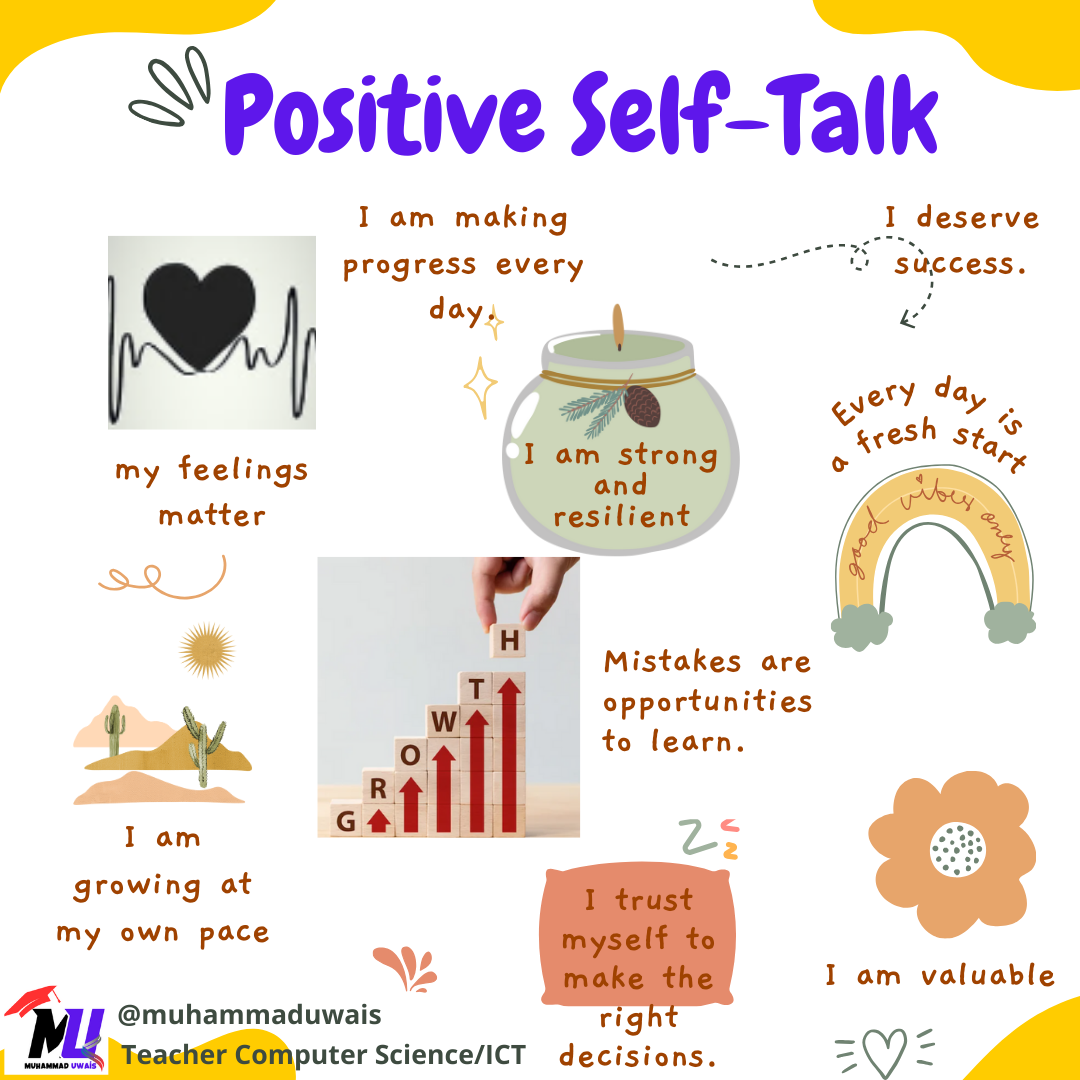In our daily lives, the way we talk to ourselves plays a significant role in shaping our mindset, behavior, and overall well-being. This internal dialogue, known as self-talk, can either empower or hinder us depending on whether it’s positive or negative. Positive self-talk is the practice of nurturing encouraging, optimistic, and constructive thoughts about oneself, and it has profound effects on mental and emotional health.
What is Positive Self-Talk?
Positive self-talk is the internal narrative that affirms your abilities, values, and potential. It involves reframing negative thoughts into constructive ones and choosing to focus on solutions rather than problems. For example, replacing “I can’t do this” with “This is challenging, but I can find a way through it” transforms the narrative from defeat to determination.
Unlike wishful thinking, positive self-talk is grounded in realism. It’s not about ignoring challenges but approaching them with a mindset that fosters growth and resilience. By practicing self-compassion and realistic optimism, individuals can turn inner criticism into motivation and problem-solving.
Why Positive Self-Talk Matters
- Boosts Confidence and Resilience Positive self-talk reinforces self-belief. By focusing on your strengths and capabilities, you build confidence to face challenges. It also helps you bounce back from setbacks, as you view failures as learning opportunities rather than permanent roadblocks. When you speak kindly to yourself, you create a foundation for mental toughness that equips you to handle adversity.
- Improves Mental Health Negative self-talk is often linked to anxiety, stress, and depression. Shifting to a positive inner dialogue can reduce these feelings and foster a more optimistic outlook on life. Positive self-talk helps regulate emotions, creating a sense of inner peace. It serves as a buffer against overwhelming negative emotions, helping you stay centered even during difficult times.
- Enhances Performance Whether in academics, sports, or professional settings, a positive mindset leads to better performance. Athletes, for example, often use affirmations to maintain focus and push through difficult moments. Similarly, students and professionals benefit from positive reinforcement that strengthens focus, creativity, and problem-solving skills.
- Strengthens Relationships When you speak kindly to yourself, it’s easier to project kindness and understanding toward others. Positive self-talk can improve your communication and interactions, leading to stronger, healthier relationships. It also helps you set healthy boundaries and approach conflicts with empathy and patience.
- Fosters Personal Growth A positive inner dialogue encourages you to step out of your comfort zone and embrace new opportunities. It allows you to see challenges as avenues for learning rather than threats, fostering continuous growth and self-improvement.
How to Practice Positive Self-Talk
- Identify Negative Patterns Awareness is the first step to change. Pay attention to your thoughts, especially in challenging situations. Are you overly critical of yourself? Do you jump to negative conclusions? Identifying these patterns is crucial. Journaling can help you recognize recurring negative thoughts and pinpoint triggers.
- Reframe Negative Thoughts When you catch yourself thinking negatively, challenge those thoughts. Ask yourself:
- Is this thought based on facts or assumptions?
- How would I view this situation if a friend were experiencing it? Replace harsh criticism with gentle encouragement. For instance, turn “I’ll never get this right” into “I’m making progress, and I’ll improve with practice.” Over time, reframing becomes a natural response to negativity.
- Use Affirmations Incorporate affirmations into your daily routine. Statements like “I am capable,” “I deserve success,” or “I am worthy of love and respect” can help rewire your mindset over time. Say these affirmations aloud or write them in a journal to reinforce their impact. Tailor affirmations to specific goals or challenges to make them more meaningful.
- Surround Yourself with Positivity The environment you’re in influences your thoughts. Spend time with supportive people who uplift you, and engage in activities that bring joy and fulfillment. Avoid toxic environments that fuel self-doubt. Additionally, consume content—books, podcasts, or videos—that inspires growth and positivity.
- Practice Gratitude Gratitude shifts focus from what’s lacking to what’s abundant in your life. Regularly acknowledge things you’re thankful for, no matter how small. Gratitude fosters a positive perspective and reduces the inclination toward negativity. Keep a gratitude journal to consistently remind yourself of life’s blessings.
- Be Patient with Yourself Changing your internal dialogue takes time and effort. Don’t be discouraged by setbacks. Treat yourself with the same kindness and patience you would extend to a close friend. Remember, progress is not linear, and every step forward counts.
Here are 20 effective self-talk statements:
- “I am capable of achieving my goals.”
- “I am learning and growing every day.”
- “Challenges help me become stronger.”
- “I am proud of how far I have come.”
- “I deserve happiness and success.”
- “I can handle whatever comes my way.”
- “I am confident in my abilities.”
- “I have the power to create positive change.”
- “I am in control of my emotions.”
- “I am grateful for the good in my life.”
- “I am resilient and can overcome setbacks.”
- “Mistakes are opportunities to learn and grow.”
- “I trust myself to make the right decisions.”
- “I am worthy of love and respect.”
- “My potential is limitless.”
- “I am more than enough.”
- “Every small step I take leads to progress.”
- “I release the need for perfection and embrace growth.”
- “I choose positivity and optimism in every situation.”
- “I am a work in progress, and that is okay.”
The Science Behind Positive Self-Talk
Research in psychology and neuroscience supports the benefits of positive self-talk. Studies show that positive thinking activates the brain’s reward system, releasing chemicals like dopamine and serotonin, which enhance mood and motivation. Cognitive-behavioral therapy (CBT) often incorporates techniques to reshape negative self-talk, demonstrating its effectiveness in treating mental health issues.
The brain’s neuroplasticity allows it to adapt and change. Practicing positive self-talk consistently strengthens neural pathways associated with optimism, making positive thinking more natural over time. This rewiring effect underscores the transformative potential of self-talk on overall mental health.
Real-Life Applications of Positive Self-Talk
- In the Workplace: Use self-talk to overcome impostor syndrome. Remind yourself of your achievements and skills when self-doubt arises. For example, tell yourself, “I’ve earned my place here and am fully capable of contributing.”
- In Relationships: Practice self-compassion to build healthier connections with others. Positive self-talk can help you approach misunderstandings with patience and avoid unnecessary conflict.
- In Education: Encourage yourself during difficult exams or projects with affirmations like “I am prepared and capable.” A positive mindset enhances focus and reduces performance anxiety.
- In Fitness Goals: Replace “I’m too tired to exercise” with “I’ll feel energized after this workout.” Positive reinforcement can help you stick to your fitness routine and celebrate progress.
- In Parenting: Teach children the power of positive self-talk by modeling it. Encouraging phrases like “I can solve problems” or “I’m learning something new” can inspire resilience in young minds.
Conclusion
Positive self-talk is more than just thinking happy thoughts; it’s a powerful tool for transforming your mindset and creating a fulfilling life. By actively choosing to nurture empowering and constructive thoughts, you can unlock your true potential and face life’s challenges with resilience and confidence. Remember, the most important conversations you’ll ever have are the ones you have with yourself—make them count. With practice and consistency, positive self-talk can become a habit that reshapes your reality and empowers you to thrive.



